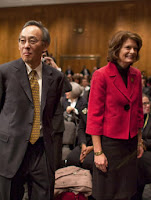 WASHINGTON — Coming from oil-rich Alaska, Sen. Lisa Murkowski could be expected to promote oil and gas development zealously and give short shrift to renewable wind and solar power.
WASHINGTON — Coming from oil-rich Alaska, Sen. Lisa Murkowski could be expected to promote oil and gas development zealously and give short shrift to renewable wind and solar power.But Murkowski approaches energy with the same pragmatism that marks her general approach in the Senate. While championing the traditional fossil fuels so vital to her home state, Murkowski also embraces renewable energy and generally supports a cap on greenhouse gas emissions blamed for climate change.
Murkowski’s stance puts her to the left of many of her Republican colleagues, and even her father, Frank, whom she replaced in the Senate six years ago.
“It’s clear she’s not just picking the same old messages from the same old Republican playbook,” said Jim DiPeso, vice president for policy of Republicans for Environmental Protection. As the top Republican on the Senate Energy and Natural Resources Committee, Murkowski is poised to play a major role as Congress debates the nation’s energy policy this spring. Already, she and the panel’s chairman, Jeff Bingaman, D-N.M., have spent months huddling over a massive energy bill that aims to advance renewable power and speed the deployment of high-voltage lines to carry that electricity across the nation.
Murkowski’s views are inextricably tied to her home state of Alaska, where drilling yielded enough oil and natural gas in 2006 to make it the nation’s second-biggest producer, behind Texas. The wells also produce royalty revenue that flows into state coffers and goes directly to Alaskans in the form of annual dividend checks.
But Murkowski insists it is a national imperative — not just a parochial concern — for Congress to chart the country’s energy path. Like other lawmakers from Alaska, including Democratic Sen. Mark Begich, Murkowski wants to allow drilling in the Arctic National Wildlife Refuge — an idea that is dead on arrival in the Democratic-controlled House and Senate.
Recognizing the dynamic, Murkowski this year is sponsoring legislation that would capitalize on advances in directional drilling by allowing oil and natural gas to be siphoned from under ANWR’s coastal plain, as long as developers don’t build wells or roads inside the refuge’s borders. Instead, operations would take place miles away, outside the refuge.
Murkowski has been a vocal proponent of federal loan guarantees to advance wind and solar production and the development of biofuels made from plant materials. But she stops short of wanting a federal mandate for renewable energy. She does not back Bingaman’s plan to require that utilities generate 20 percent of their electricity from renewable sources by 2021. And Murkowski argues that nuclear power should be count toward that mandate, which Bingaman opposes.
Murkowski’s biggest break with her party comes on climate change. While some Republicans dispute the science behind global warming, Murkowski says she has witnessed firsthand the damaging effects of a rising global temperature in Alaska’s melting ice pack and thawing permafrost.
Convinced that heat-trapping pollutants contribute to climate change, Murkowski generally backs federal limits on carbon dioxide emissions. Last year, she joined Bingaman in sponsoring legislation that would allow oil refineries, manufacturers and other industrial operations to comply with new emissions limits by buying and selling emission permits.
The issue will test Murkowski again this year. Home-state interests pull her in different directions, keeping her between fishermen and coastal residents alarmed at the melting ice pack and energy developers tapping the state’s oil and gas.
Further complicating the issue for Murkowski is the possibility of a GOP primary challenge next year from Alaska Gov. Sarah Palin — the 2008 Republican vice presidential candidate whose name became synonymous with a “Drill, baby, drill!” chant during the campaign. Palin’s first term as governor ends next year.
Murkowski chafes that the oil and gas industry is an easy political target and has criticized Obama administration proposals to raise taxes on the sector. “People get up in the morning to hate the oil industry,” Murkowski said recently.
Murkowski’s willingness to approach complicated problems from multiple points of view gives her credibility on Capitol Hill, said Lou Hayden, a senior policy analyst with the American Petroleum Institute. “When she speaks,” he said, “she’s listened to.”
No comments:
Post a Comment